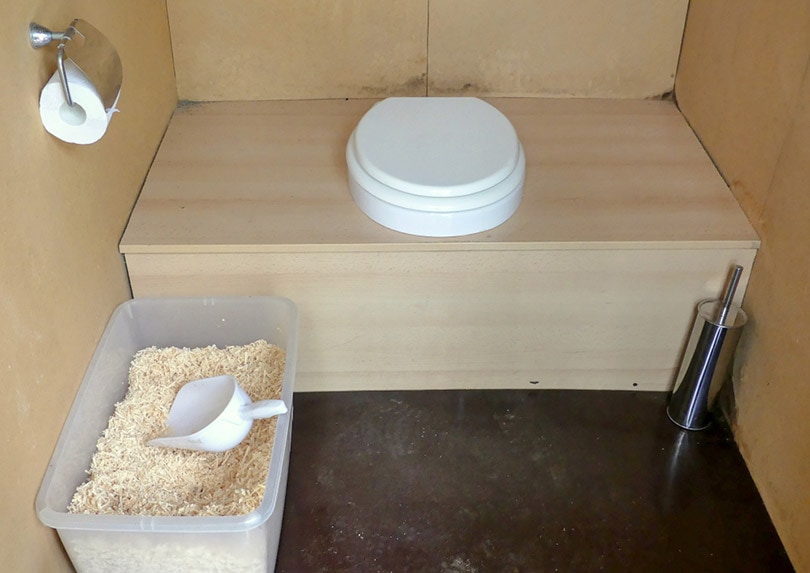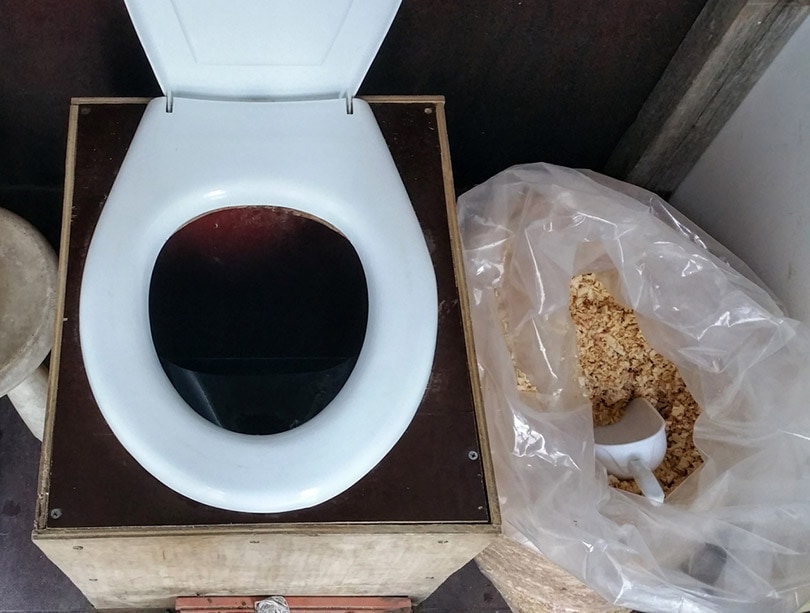What States Allow Composting Toilets? 2025 Update
-

- Last updated:

Let’s start by figuring out what exactly composting toilets are. Composting toilets mix toilet waste with dry material, like sawdust or wood chips. The dry material soaks up moisture and creates a slurry that has a suitable carbon-nitrogen ratio for composting.
These toilets are commonly used by those with no or poor access to wastewater and drainage systems and where a septic tank is not an option. They are also used in RVs and mobile homes. However, depending on the state and the local area you live in, the laws and rules governing the installation and use of composting toilets can differ.
Some states prohibit their use. Others go out of their way to accept their use. And yet, some have no regulations on their use whatsoever. You will need to check with local state or city regulations because these can differ, but we have included a list of the 27 states that do allow the use of this type of home toilet.
States That Allow Composting Toilets
The following states allow the use of composting toilets but may have additional requirements that need to be met. For example, while some states allow for the use of this type of toilet when no other option is available, others allow for a composting toilet only where there is an existing plumbed toilet already on the premises.
- Kentucky
- Louisiana
- Maine
- Minnesota
- New Hampshire
- North Dakota
- Ohio
- Oregon
- Utah
- Vermont
- Wisconsin

NSF Approved Toilets Only
The National Science Foundation (NSF) is a government body that conducts research in science and engineering. The group accredits composting toilets that have met six strict standards to ensure the efficacy and efficiency of the toilets. They ensure that the toilet can handle regular use, does not give off bad smells, and that the composted waste meets safe bacterial requirements.
Approved toilets include an NSF mark, and the following states require that any property wishing to use a composting toilet must use one that has been accredited by the NSF.
- Arkansas
- Colorado
- Florida
- Georgia
- Hawaii
- Illinois
- Maryland
- Pennsylvania
- Tennessee
- Texas
Grey Water Disposal System Requirements
A greywater system, or greywater disposal system, is a wastewater system that collects water from sinks, showers, and washing machines. They recycle the water by cleaning it and then pumping it straight back into the toilet. The water is usually passed through a biofilter and a sand and gravel filter, and greywater systems have been shown to reduce household water usage by as much as 40%.
However, these systems are expensive, and they require the water to be treated properly. Although they are gaining popularity in some hotels and commercial premises, they have yet to become popular with homeowners. The following states mandate that a property must have a greywater disposal system before they are allowed to install a composting toilet.
- South Carolina
- West Virginia
Permit Required
Some states require that a property owner applies for and receives a permit before they are allowed to install a composting toilet. The permit application usually needs to detail any existing toilet and wastewater solutions on the property and must show how the waste will be composted. In the case of at least one state—Idaho—it is necessary to get a permit and also to have a greywater system installed. The following states require permits for composting toilets.
- Arizona
- Idaho
- Nebraska
- Nevada
- New Mexico
- Wyoming
Composting Toilets as Secondary Toilets
Some states allow the addition of a composting toilet at a property where there is an existing flushing toilet, even if the composter will be the main toilet at the property. However, if you are looking to install a composting device to save space, this won’t help.
Always Check Local Rules
Always check state rules, as well as local municipality and state laws. Some cities have their own requirements, and you need to check them because if you are found to have a composting toilet when it is prohibited, you will be forced to remove it and may face a fine.
How Does a Composting Toilet Work?
A composting toilet needs to compost waste, including toilet paper. It needs to do it quickly and without causing any unwanted odor. It also needs to ensure that the compost is bacterially safe and can be handled without danger to health.
This type of toilet mixes the waste with a solid material, like sawdust or coconut coir. This anaerobic process prevents noxious smells. The toilet will usually have a separate chamber used to collect the condensation that forms during the process. The resulting compost can be removed and safely used as compost.
Different toilets do use different techniques, but most rely on a similar process to achieve the desired composting results.
What Are the Benefits?
- Minimized Water Consumption: Around 30% of the water used in a home is from flushing the This is the same treated, high-quality water that we drink and is used in other areas of the home, but it doesn’t need to be. A composting toilet effectively eliminates all of this clean water usage, making them even more efficient than dual-flush and water-efficient toilets.
- Easy Installation: You don’t need to know how to plumb a toilet or connect one to the main water supply when installing a composting toilet. This not only means that you can potentially install one yourself, but it reduces the cost of adding a new toilet.
- No Plumbing Required: Because the toilet doesn’t need plumbing or any special installation, it can be installed in situations where plumbing is not available. One can be used in an RV or static home, in the small area under the stairs, or virtually anywhere else there is room.
- Free Compost: Another big benefit of the composting toilet is that it produces compost. The compost is safe for use on vegetables and fruits. Or, if you’re not comfortable using it this way, it can be used as mulch for flowers and trees in your garden.
Disadvantages of Composting Toilets
- Handling Human Waste: Not everybody is comfortable with handling human waste, which is perfectly understandable since the toilet will need regular emptying. If you don’t like the idea of this, you will need to find an alternative solution.
- More Work: The size of your family, their daily toilet use, and the size of the toilet itself will ultimately determine how often one needs emptying, but you should expect to have to empty a composter every 1–3 months, although yours may only need emptying twice a year with the right model of toilet. You should also expect to inspect the toilet every month or so to ensure it is operating smoothly and efficiently.
- Higher Initial Cost: A composting toilet can cost up to twice as much as a flushing toilet. If you have metered water, you will save money in the long run by using less water, but the initial cost is certainly greater.
- Permits and Rules: You will need to ensure the legality of installing and using a composting toilet. In some states, these rules can be challenging and have many other extra requirements, like the installation of a greywater system.
Do You Need Planning Permission for A Composting Toilet?
Although you don’t strictly need planning permission for a composting toilet, many states and cities have their own regulations and rules that govern the installation of these waterless toilets. You may need a permit and may have to meet certain other requirements.
Do Composting Toilets Work in Cold Climates?
The composting process itself creates a warm environment, and composting toilets do work in all climates. However, extreme cold temperatures can prevent or slow the composting process, so it is best to have this kind of toilet in a warmer area of the house when possible.
Conclusion
Composting toilets are a type of waterless toilet that provide a potential alternative to septic tanks and plumbing. However, not all states allow for their installation, and some areas require you to meet other, sometimes stricter, requirements for installation.
If the composting toilet is an addition to a home that already has a flushing toilet, the rules are likely easier to meet. For new builds, the regulations can be a lot harsher, and you must check with the state and local bodies to determine what regulations surround the use of these water-saving devices.
Featured Image Credit: Stephen William Robinson, Shutterstock
Contents


